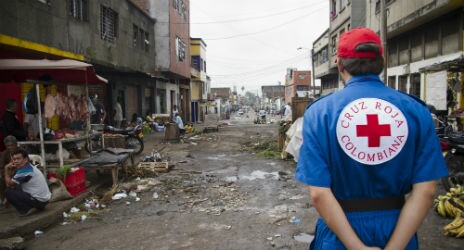
On April 24, 2012, President Juan Manuel Santos of Colombia signed the Act 1523, establishing the “National System for Disaster Risk Management” and adopting a new national policy on disaster risk management. The new act and policy make a number of advances toward promoting a holistic approach to disaster management in Colombia.
Unlike previous legislation, the new Act and policy focus not only on the improvement of disaster response mechanisms, but also on disaster preparedness and risk knowledge. As such, the Act creates a regime which redefines the roles and responsibilities of government entities in charge of disaster management, as well as those of civil society actors and private entities. “We are very pleased to see the essential role of the Colombian Red Cross enshrined in this new law,” noted Mr Walter Ricardo Cotte Witingan, former Executive Director of the Colombian Red Cross Society, “As a participant in the National Council for Risk Management, created by the law, we look forward to applying our expertise in elaborating disaster management policies, the national risk management plan and any emergency responses.”
The Act also stresses the importance of capacity building and risk reduction, and requires full coordination and involvement of departmental, district and municipal levels in such tasks. “The Act recognises that local communities must be engaged when disaster risk reduction plans or response mechanisms are being developed by the authorities,” observed Isabelle Granger, IFRC’s Disaster Law Coordinator for the Americas. “Importantly, it also makes resources available for disaster management and creates new territorial funds, administrated by mayors and governors, in order to promote an expedient response to disasters at the local level.”
The law contemplates a special regime that will operate in the event of a disaster or public calamity. During that time, special measures relating to contracting procedures, tax controls on resources, relocation of settlements and credits for affected individuals, among others, will be applied in order to assist the affected areas in recovering from the disaster or public calamity.
In regard to international relief operations in Colombia, article 43 of the Act tasked the Ministry of Foreign Affairs and the National Unit for Disaster Risk Management (UNGRD) to develop a strategic plan for coordination of international assistance. The Colombian Red Cross Society provided its support to the Government of Colombia in developing the new strategic plan. The Strategic Plan for International Cooperation adopted in June 2013 drew on the recommendations of the IDRL Guidelines. It underlines existing challenges of international assistance and establishes the UNGRD as the coordinator of the National System for Disaster Risk Management. In case of a disaster requiring international assistance, the UNGRD is responsible for the coordination of national and international efforts in order to avoid duplication of efforts and ensure effective cooperation.
The Strategic Plan also addresses specific IDRL issues, among which the development of standards and protocols facilitating international humanitarian assistance in case of an emergency. With that in mind, Colombia developed the IDRL Road Map, a guide and tool for all components of the UNGRD and the National System. It aims to strengthen the Colombian legal system in matters related to international cooperation and assistance in time of disaster by developing legal and operational IDRL instruments. The process was initiated in November 2013.
Also in 2013, Colombia and Ecuador organized a joint desk simulation exercise with the objective of strengthening mechanisms of bilateral cooperation. This simulation was part of the Road Map activities for the legal framework development. Through the exercise and its aftermath analysis, the UNGRD was able to identify good practice as well as issues to be considered for future emergency situations. An outcome of the exercise was the establishment of an IDRL Committee, encompassing different entities including the Department of Immigration, the Ministry of Foreign Affairs, the Colombian Red Cross, the UNGRD, the Colombian Presidential Agency for International Cooperation, the National Fire Brigade and others. The objective of the Committee is to identify procedures, activities and tasks that need to be reviewed within each entity to improve the efficiency of cooperation and to facilitate the entry of humanitarian assistance in case of an emergency.
The Government is now in the process of developing new regulations which would implement the legislation and its strategic plan at the operational level.